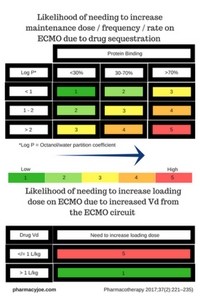In this episode I’ll:
1. Discuss Part 2 of the Guidelines for the Diagnosis and Management of Critical Illness-Related Corticosteroid Insufficiency (CIRCI) in Critically Ill Patients.
2. Answer the drug information question “Does dexmedetomidine prolong the QTc interval?”
3. Share a resource for looking up chemical and physical properties of a medication.
Article
Lead author: Stephen Pastores
Published in Critical Care Medicine November 2017
This part of the guidelines addresses 5 clinical questions and provides recommendations for or against the use of corticosteroids.
The first question is:
Should corticosteroids be administered to hospitalized adults with community-acquired pneumonia (CAP)?
The recommendation from the guideline authors is:
We suggest the use of corticosteroids for 5−7 days at a daily dose < 400 mg IV hydrocortisone or equivalent in hospitalized patients with CAP (conditional recommendation, moderate quality of evidence).
This recommendation is due to corticosteroids reducing mortality, length of stay, need for mechanical ventilation, and development of ARDS. These benefits come at the expense of hyperglycemia, which is easily managed. The benefits appear to be greatest in patients with severe infection.
The second question is:
Should corticosteroids be administered to hospitalized adults with influenza?
The recommendation from the guideline authors is:
We suggest against the use of corticosteroids in adults with influenza (conditional recommendation, very low quality of evidence).
This is due to the inconsistency of results across studies.
The third question is:
Should corticosteroids be administered to hospitalized adults with bacterial meningitis?
The recommendation from the guideline authors is:
We recommend use of corticosteroids in patients with bacterial meningitis (strong recommendation, low quality of evidence).
The best evidence of benefit is in preventing hearing loss and neurological problems, and this was judged to be clinically significant. Mortality may be reduced with Strep pneumoniae meningitis.
The fourth question is:
Should corticosteroids be administered in adults undergoing cardiopulmonary bypass surgery?
The recommendation from the guideline authors is:
We suggest use of corticosteroids in patients undergoing cardiopulmonary bypass surgery (conditional recommendation, moderate quality of evidence).
The evidence of benefit across studies was for decreased mortality and new-onset atrial fibrillation.
The fifth question is:
Should corticosteroids be administered to adults who suffer a cardiac arrest?
The recommendation from the guideline authors is:
We suggest use of corticosteroids in the setting of cardiac arrest (conditional recommendation, very low quality of evidence).
This recommendation was based on the evaluation of the steroid + vasopressin + epinephrine studies out of Greece that I talked about in episode 26. This is, in my opinion, the most controversial of the recommendations put forth by these guidelines. The authors make no note of the fact that the ACLS guideline authors looked at the very same data and concluded that additional study was needed before steroid use in cardiac arrest could be recommended. So now we have the Society of Critical Care Medicine looking at the same data as the American Heart Association and coming to the opposite conclusion.
Drug information question
Q: Does dexmedetomidine prolong the QTc interval?
A: Maybe.
Dexmedetomidine appears to have been added to a list of drugs that possibly prolong the QTc based on a single case report where pediatric use of dexmedetomidine unmasked congenital long QT syndrome. However, there are no published reports of dexmedetomidine use leading to torsades. Additionally, there is a study that reports dexmedetomidine shortened the QT interval during the infusion of a bolus dose.
The available data is too weak and conflicting to make me concerned about the potential of dexmedetomidine to prolong the QT interval in adult critically ill patients.
It is worth noting that Dexmedetomidine causes prolongation of the qtc interval which might predispose to torsade de point.
— MOHAMED ELBAHR (@drmwasal) November 24, 2017
— MOHAMED ELBAHR (@drmwasal) November 24, 2017
I wonder if, since bradycardia is a risk factor for the development of torsades, the issue is more the bradycardia from dexmedetomidine in an at-risk patient and less some direct action of dexmedetomidine?
— Pharmacy Joe ?? (@PharmacyJoe) November 25, 2017
Resource
The resource for this episode is the PubChem database. PubChem is an open chemistry database at the National Institutes of Health (NIH). They collect information on chemical structures, identifiers, chemical and physical properties, biological activities, patents, health, safety, toxicity data, and many others. Data is added by researchers, manufacturers, government entities, journal publishers and more. I’ve used this database for things like looking up the octanol/water partition coefficient of medications when trying to determine if they require dose adjustment during extracorporeal membrane oxygenation like I discussed in episode 213.
You can immediately access my ECMO dose adjustment guide by registering for my free download area here (it’s download #15):
If you like this post, check out my book – A Pharmacist’s Guide to Inpatient Medical Emergencies: How to respond to code blue, rapid response calls, and other medical emergencies.
